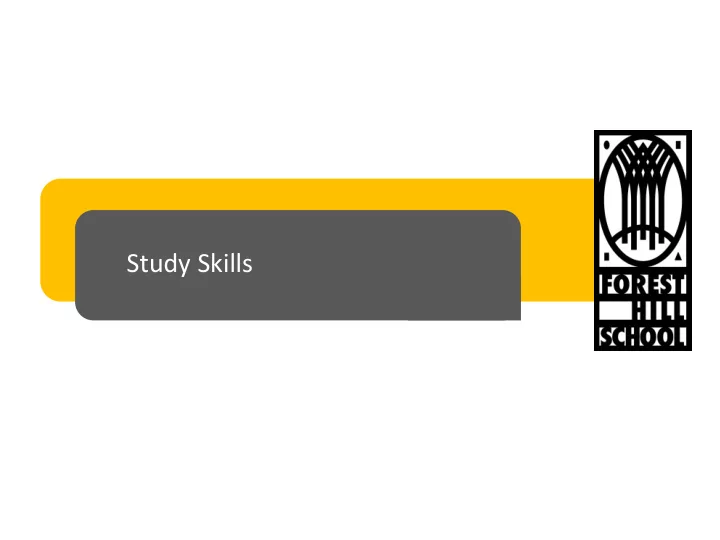

SLIDE TITLE Study Skills
WE REMEMBER… ▪ 20% of what we READ ▪ 30% of what we HEAR ▪ 40% of what we SEE ▪ 50% of what we SAY ▪ 60% of what we DO ▪ 90% of what we SEE, HEAR, DO AND SAY
KEY PRINCIPLES We remember better when things are: ▪ In colour ▪ IN CAPITALS ▪ Underlined ▪ Pictorial ▪ Unusual
KEEP REVISION ACTIVE! ▪ Journey it ▪ Map it ▪ Index it ▪ Story it ▪ Flip It ▪ Post it ▪ Comic it ▪ Sing it
This is the usual approach. On the slide below is a different approach you might prefer.
Which is more effective to make? Which is easier to remember?
RETENTION! ▪ 48 hours after learning a topic we remember less than 20% ▪ Reviewing the same day and the next day helps you remember THREE times as much!
▪ Ineffective approach Topic 1 Topic 2 Topic 3 ▪ Retention approach Topic 1 Topic 2 Topic 3 Topic 4
RETRIEVAL PRACTICE AND INTERLEAVING Retrieval practice is something many students do anyway but the important thing is that they leave enough time to try and forget the information they have learnt before retrieving it from their memory! ▪ Decide which topic you are going to revise. ▪ There are two different approaches (see next slide). Use these after you have learnt the topic. The idea is that you leave a bit of time before revising the topic. The approach works because you are forcing yourself to try and remember.
RETRIEVAL PRACTICE AND INTERLEAVING APPROACH 1 APPROACH 2 Write down everything you can remember about the When you are learning the topic, prepare a set of topic on a piece of paper. questions on flash cards. Really search your memory and try to get as much When you come to revise the topic, test yourself or get information down as you can. somebody else to test you. You could also make half- completed mind maps that you then try and complete. Compare the information you have written with your Do not go over the information first. notes or your revision guide, fill any gaps and correct any mistakes. Check and correct your answers. ▪ Repeat a few days later. ▪ Jumbling up topics and making sure that you re-visit them is far more effective than just working your way through from one topic to the next.
USEFUL WEBSITES https://www.learningscientists.org/learning-scientists- podcast/2017/12/6/episode-8-interleaving https://www.retrievalpractice.org/strategies/2018/8/3/more- strategies https://www.ocr.org.uk/Images/340584-spaced-review-and- interleaving-teacher-guide.pdf https://www.doddlelearn.co.uk/retrieval- practice/?utm_source=google&utm_medium=ads&utm_campaig n=retrieval-practice&utm_term=retrieval- practice&utm_content=GL2519&gclid=EAIaIQobChMIv8OE4t6N5 wIVibHtCh0VhASNEAMYASAAEgKTefD_BwE
Recommend
More recommend